Aaron Hernandez Found Not Guilty in Second Murder Charge : A Well Thought Out Scream by James Riordan
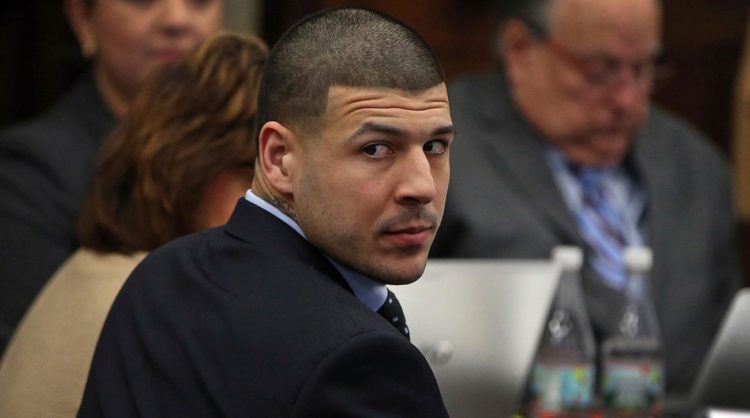
So, remember when you were a little kid and your Mom didn’t want you to play football because you could get hurt? Remember how she said the big kids on the field were too mean? Well, she was right. Even though former New England Patriot tight end Aaron Hernandez was acquitted of two additional murder charges this week, more evidence surfaced during the trial that this is one dangerous man. Hernandez was recently found not guilty of a double murder charge dating from 2012. He is already serving a life sentence for a murder he committed in 2013.
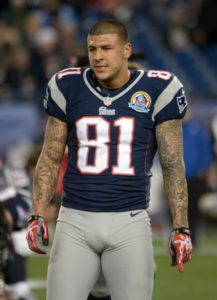 Prosecutors had claimed that Hernandez killed Daniel de Abreu and Safiro Furtado over a spilled drink. They argued that Hernandez shot into the car the victims were in because he felt disrespected when one of the men bumped into him and spilled his drink at a Boston nightclub. Hernandez was also acquitted Friday of shooting his one-time close friend Alexander Bradley in the face months later to try to keep him from testifying against him. Bradley had been in the car with Hernandez when he supposedly fired the shots and lost his right eye in the later shooting.
Prosecutors had claimed that Hernandez killed Daniel de Abreu and Safiro Furtado over a spilled drink. They argued that Hernandez shot into the car the victims were in because he felt disrespected when one of the men bumped into him and spilled his drink at a Boston nightclub. Hernandez was also acquitted Friday of shooting his one-time close friend Alexander Bradley in the face months later to try to keep him from testifying against him. Bradley had been in the car with Hernandez when he supposedly fired the shots and lost his right eye in the later shooting.
Hernandez was charged with eight counts including two of murder and three of armed assault, but was only convicted of the gun charge. Defense attorneys argued that Bradley, an admitted drug dealer, shot the men over a drug deal. The defense hammered at Bradley’s credibility, citing his immunity deal with prosecutors to testify against Hernandez, his role as the driver of the car the night of the shootings and his criminal record. Bradley is serving a five-year prison term in Connecticut for firing shots at a Hartford nightclub in 2014. Bradley claimed Hernandez became enraged after de Abreu bumped into him while dancing. He said Hernandez later opened fire on the men’s car as they waited at a stoplight.
Chicago Bears wide receiver Deonte Thompson, a former teammate of Hernandez’s at the University of Florida, testified at the trial about the friendship between Hernandez and Bradley. Prosecutors introduced evidence at the trial that Hernandez got a tattoo which they believe memorialized the double slaying. California tattoo artist David Nelson testified that Hernandez requested an image of a revolver with the gun barrel facing forward. Hernandez wanted five bullets visible in the cylinder of the gun and one cylinder empty, Nelson said. Authorities said Hernandez fired five shots from a revolver into the car carrying de Abreu and Furtado.
When the verdict was announced Hernandez wept quietly. One of his defense attorneys hugged him as relatives of the victim in the case began to sob loudly. It took the jury six days to decide that Hernandez was not guilty of first-degree murder in the killings of Daniel de Abreu and Safiro Furtado. The jury did convict him of the unlawful possession of a .38-caliber revolver and the judge gave him an additional four to five years in prison, separate from his existing life sentence. So I guess that means when he dies, he has to come back and serve more time. No, but it does mean that if the guilty verdict in his previous trial is ever overturned or commuted, he will still have to do time on the gun charge.
Ronald Sullivan, one of the Hernandez defense attorneys, said he was delighted about the verdict and that Hernandez was relieved. “He was charged for something somebody else did, and that is a weighty burden for anyone to shoulder.”
Another Hernandez attorney, Jose Baez, is known for having secured an acquittal in 2011 for Casey Anthony, who was accused of killing her 2-year-old daughter, Caylee.
Hernandez is already serving a life sentence for the 2013 killing of Odin Lloyd (left), a semi-professional football player who was dating the sister of Hernandez’s fiancee. Prosecutors in the double-murder trial weren’t allowed to mention his conviction in Lloyd’s case. In that trial, jurors deliberated for 36 hours over seven days before convicting Hernandez of murder.
Odin Lloyd, 27 was found executed in an industrial park near Hernandez’s mansion. In that case prosecutors maintained that Hernandez was high when he killed Lloyd. They cited a security surveillance video that was taken at the gas station where Hernandez bought a cigar and bubble gum twenty minutes before he picked up Odin Lloyd. Lloyd, 27, a semi-professional football player, was found dead later that same day in an industrial park close to the former football star’s mansion in North Attleborough, Massachusetts. ‘He danced in his own headlights for so long the gas station attendant turned off the outside lights to get rid of him,’ said a high-ranking law enforcement source. ‘He was apparently high, or very much appeared to be.’ Court records filed by investigators in the case state that video shows Hernandez stopped at the Blue Hill Express Service Station at 2.09 am on June 17, 2015. Investigative sources at the time said that Hernandez was a heavy user of PCP, alcohol and hydroponic marijuana. A manager at the Blue Hill Express Service Station who asked not to be identified confirmed the dancing video, and said all of the security footage had been turned over to investigators.
ATF agents launched a federal probe into weapons found at Hernandez’s home. Footage from the home’s security system was discovered showing Hernandez with a gun.
Alexander Bradley, left, who claimed Hernandez blew out his eye, testified to a grand jury that Hernandez was the gunman in the fatal drive-by in Boston in 2012
Aaron Hernandez grew up in a tough neighborhood in Bristol, Connecticut, and played for the Patriots from 2010 to 2012. He was a fourth round draft pick About six weeks after Furtado and de Abreu were killed, Hernandez signed a five-year, $40 million contract with the Patriots and went on to play another season before Lloyd was killed. In all, Hernandez played three years in the NFL catching 175 passes for 18 touchdowns. He was cut from the team shortly after he was arrested in Lloyd’s killing in June 2013. He was not charged in the 2012 killings until 2014. Hernandez has appealed for a new trial in that case.
Hernandez’s troubles were well known, long before the Patriots selected him in the fourth round. Running a background check on prospects is not uncommon. Generally, if a player has character issues, the teams interested in him have many opportunities to find them out before the NFL draft
Hernandez left Bristol for Gainesville a year after his father, Dennis, died after complications from hernia surgery. Hernandez has said his father’s death affected him deeply, and sent him on a self-destructive path; his older brother, D.J., did everything he could to keep Aaron focused on football and school. The scout said Hernandez had long been around “street activity,” and once his father died, it gave him reason to act out.
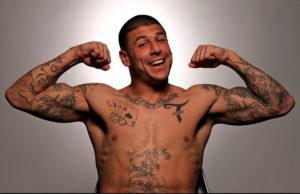 Not long after arriving at Florida, Hernandez was questioned in connection with a shooting outside of a nightclub, the scout said, but nothing came of it. He was suspended for one game during his Gators career for failing a drug test; the scout said a suspension isn’t usually handed down until the third or fourth failed test.
Not long after arriving at Florida, Hernandez was questioned in connection with a shooting outside of a nightclub, the scout said, but nothing came of it. He was suspended for one game during his Gators career for failing a drug test; the scout said a suspension isn’t usually handed down until the third or fourth failed test.
After the Patriots drafted Hernandez in the fourth round in 2010, the Boston Globe quoted one NFL executive who suggested he had failed four to six drug tests in his college career. Hernandez released a statement after that report was published, saying he only failed one test. A second scout, who worked for an AFC team before the 2010 draft, said Hernandez’s marijuana and character problems were the worst-kept secret in the scouting community.
“It was pretty well known that he had failed some drug tests at Florida, and there were questions about his maturity that come along with that,” the scout said. “You worried about the people he hung out with.”
Though the first scout said Hernandez’s friends from Connecticut made visits to Florida, one former Florida staffer said then-coach Urban Meyer “didn’t let anyone in” to the program who wasn’t part of a player’s support circle. “[Hernandez] was extremely young when he got there for us, we knew that, but it seemed like he had turned a corner and was maturing,” the former Gators staffer said. “We knew there were things to work through. Hard-working kid, guys on team loved him. He’s a tough guy; he didn’t take crap off anybody, but never to the lines of what’s being talked about [now]. “One of Urban’s strengths, he can see a kid like that and reach them like others can’t.”
A third scout recalled that Hernandez was considered the toughest kid on the Gators’ roster and “no one will mess with him.” Despite those question marks, New England made Hernandez the 113th pick in the draft, getting what many considered to be a player with first-round talent for a fourth-round price tag.
It didn’t take long for Hernandez’s quick temper to be revealed at Gillette Stadium. According to an NFL source, within days of being drafted, Hernandez was at the team facility trying to watch film. When he couldn’t figure out how to use the equipment, he asked how it worked, but got no answer. When Wes Welker walked by the room, Hernandez asked for his help, but Welker said, “Rookie, you figure it out.” Hernandez responded with expletives.
Hernandez spent little, if any, time with his Patriots teammates off the field, opting to spend his time with those same friends who used to visit him in Gainesville and have known him for years.
Granted, Aaron Hernandez is an unusual, isolated case, but investigations into professional football players committing violence is not. One cannot say that the NFL encourages violence among its players, but the attitude and energy expected of those who play the game definitely leans that way. While the NFL may not create the violence in its players, it certainly knows how to harvest those tendencies. No one ever says that being a violent man by nature hinders one’s career in football. Aaron Hernandez has been richly rewarded throughout his life for his violent nature. But it seems to have caught up with him in the end.
___


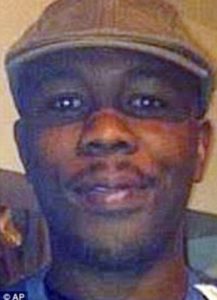
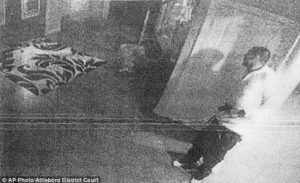
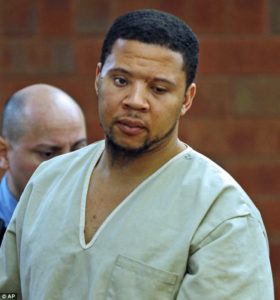
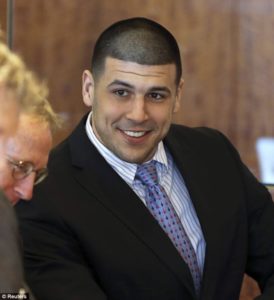
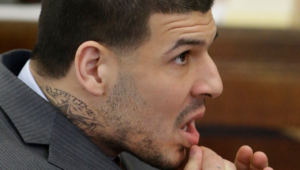

No Comment